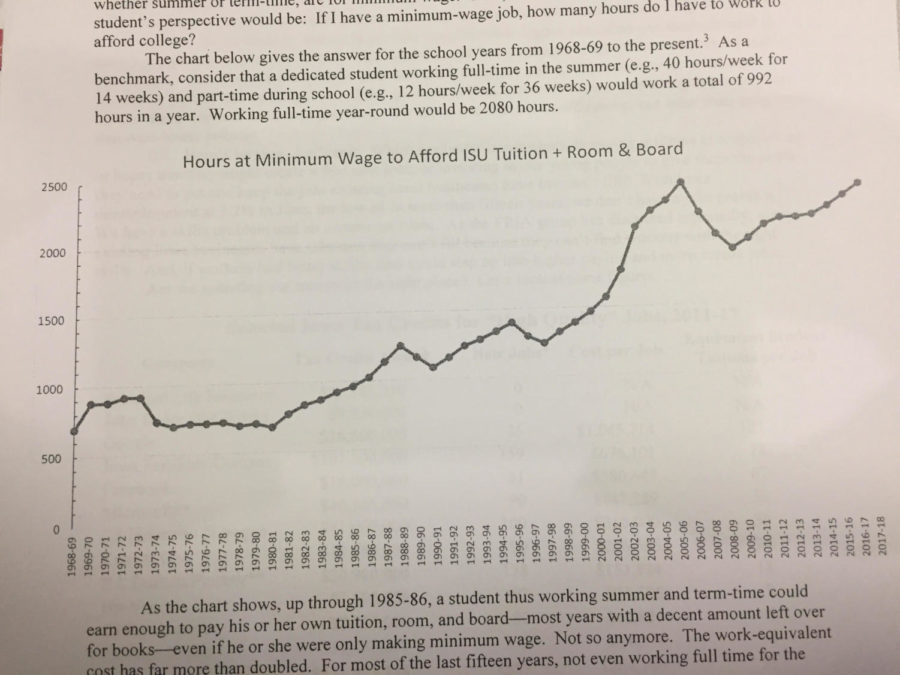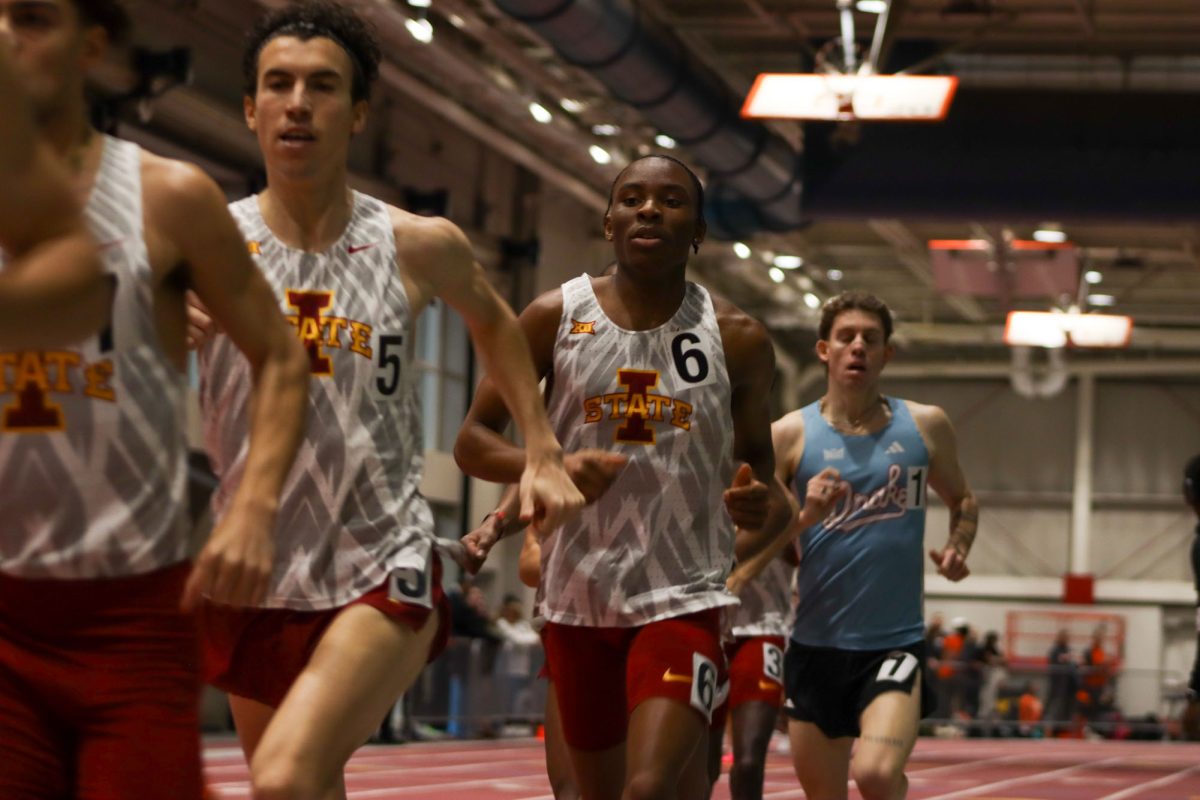- News
- News / Politics And Administration
- News / Politics And Administration / Campus
- News / Student Life
Community speaks on tuition increases following ISU proposal
Graph of minimum wage work hours for tuition
August 9, 2017
Following a presentation of a proposed tuition increase plan from Iowa State University, the Board of Regents heard feedback in a public forum from student officials, legislative representatives and other community members.
From the students
Student Government President Cody West opened the public forum.
“Doctor Allen mentioned during his presentation that breaking point that we’re at at Iowa State, and that time really is now. It’s right now,” West said. “You’ve heard the faculty resignations hurting the quality of our education and the decaying space in which we’re allowed that education and that’s all true, I experience it every day.”
West said this wasn’t about extracurricular experience or the things that provide a sense of community and keep student at Iowa State.
“Today we’re talking about why students come to Iowa State in the first place, and the primary reason, that’s to get a degree,” West said.
West said the plan can’t stop where it is, although he appreciates the ability to provide predictability to incoming students.
“There’s one thing that is variable and elastic in this situation, that’s state support. Without state support being flat, or constant, or increasing, we’re facing what we’ve been faced with the past two years, the past two summers, and that’s last-minute increases that really hurt our students and are unjust,” West said.
West said higher education needs to be a priority for Iowans again.
West’s vice president, Cody Smith, spoke next. He expressed his concern that the Board’s tuition meeting with legislators had to be canceled for lack of attendance. He felt looking at tuition as a way to support public universities goes against the land-grant mission at Iowa State to have the university be accessible.
“Everybody who attends this university will give back some way, shape and form to the state of Iowa,” Smith said.
Smith is financing his own education. He said he came with the assumption that he would be able to afford it and finance it himself.
“The plan laid forth today is great, simply because it’s a plan and we haven’t had that in the past,” Smith said.
Vivek Lawana, the president of the graduate and professional student senate, said that even if students don’t stay in Iowa, they take Iowa with them wherever they go.
“The increases that was proposed by Doctor Allen earlier is definitely unfortunate,” Lawana said.
He said when looking at Iowa State he didn’t look at the university’s rankings or accreditation, he talked to students at that time. He supposed that he could have found similar quality education at another university, but the activities and cultural would not have been there.
“Iowa indeed stands at the risk of losing its quality, both education and students activities, student experience,” Lawana said.
He also talked about the impact of enrollment on teaching assistants, who must teach more students on top of their own classes.
Another graduate student said she also came to Iowa State because of it’s inclusivity, and hoped Iowa State would continue to get the support to be a quality academic institution, to form and to train the future experts of the world.
One former student, Kaleb Vanfosson, said he had previously received tuition assistance from Iowa Vocational Rehab Services, a program cut by the state legislature, and will not be returning to college. He said he saw the issue as corruption in officials such as former Regent President Bruce Rastetter as a large republican donor and former Iowa State University President Leath’s salary.
From the faculty and staff
Jessica Bell, the president of the Professional and Scientific Council, spoke on the importance of quality staff.
“While sometimes not as visible as the faculty and the students, each and every one of the professional and scientific employees is of vital importance and incredible value to our university and to the regent system,” Bell said.
She said diminishing resources is challenging the ability to meet the land-grant mission.
“Doing more with less is not sustainable,” Bell said.
She said the council supported the university’s creation of budget models that support the university’s ability to thrive.
From the community
Representatives from Workiva and Boehringer Ingelheim Vetmedica, Inc., both spoke on the importance of quality undergraduate interns who become quality employees.
From the state legislature
Herman Quirmbach, state senator for District 23 (which includes Iowa State University), provided a letter to the regents that was read aloud for him to the room.
Quirmbach said state policy should be guided by the goals to restore state funding to the level in 2009 at 48.3 percent of the cost of education in a fixed timeline while universities freeze or limit tuition increase to inflation during that time. Longer term support should be rebalanced to no worse than 50-50, Quirmbach said, and economic development programs revised to set lower caps on the taxpayer subsidy per job to be created.
Quirmbach argued if cost should be the same as it was, even accounting for inflation, there is a significant gap using the CPI. He did not compute costs with the Higher Education Price Index, but said looking at it from the student perspective – “how much do I have to work to pay this” – would make more sense.
A graph of his calculations for what students would need to pay each year to pay for tuition and board at Iowa State shows an obvious increase. But what is more concerning is that, at minimum wage and working 40 hours per week year round (or 2080 hours, as Quirmbach calculated), students could not pay to attend the university in the last five years, and for most of the last fifteen years.
That would be asking a student to work full-time on top of getting the education they’re attempting to pay for by working.
Beth Wessel-Kroeschell, who represents the state house district that contains Iowa State University, said her dad made it through Iowa State on the GI Bill, and could not have done so without assistance.
“I don’t want you to give up on the legislative and state support,” Wessel-Kroeschell said. “I believe their is a way for us to do this, and I believe it is our responsibility to make sure that young Iowans have access to an affordable education.
“We are not in an economic recession, so we need to find where we are misspending dollars and revert those to areas that are our responsibility, and one of those is higher education.”
She asked that students contact her with their concerns.
Cindy Winckler, state house district 90, came as a representative of the Iowa House Democrats. She said the majority of the increases in general operating costs for the universities fall on students and families, and said that should not be the case.
“Certainly education is a freedom issue. It is something that all individuals have access to. And it should be, especially our public education, it should be accessible,” Winckler said.
41 percent of K-12 students receiving free and reduced lunch, Winckler said, a ten percent increase over the decade. She said those students are “pipeline.” She said increasing poverty levels in the state must be a part of the conversation for student access to higher education.
“Access will be an issue. Not access as far as qualifications and preparation, but access according to cost,” Winckler said.
In the 2016 Higher Education Report, the Iowa Tuition Grant is appropriated 48.4 million dollars that 13,300 students receive. The All Iowa Opportunity Scholarship is the only scholarship directed at public institutions for a four year degree, Winckler said, but is appropriated at 2.2 million dollars. In fiscal year 2015, there were 11,000 applications and only 427 grants could be awarded, Winckler said.
She also mentioned dual-enrollment opportunities when students are in high school for receiving college credit. She proposed that the regent universities offer the same thing to the communities around them, and that transfer credits would apply more directly.
Larry McKibben said he was a republican, but hopes the process can be apolitical.
“This is about our children and our grandchildren,” McKibben said. “Let’s all work together.”







